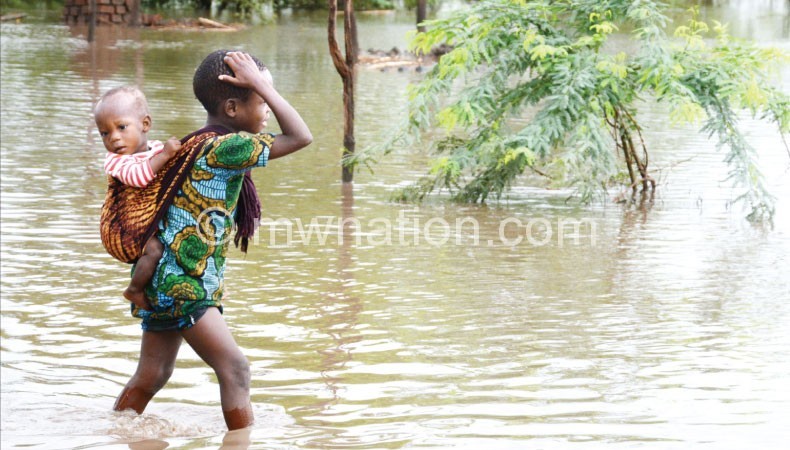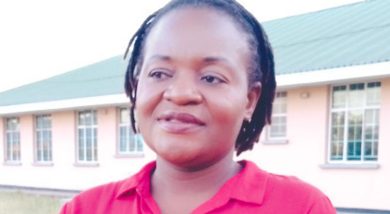Approved Disaster Policy hints at relocations
A policy statement in the recently approved Disaster Risk Management (DRM) Policy has hinted at a possible action to have people living in disaster-prone areas relocated to upland areas, The Nation has learnt.
The relocation hint represents a maiden addition to the policy document by the Peter Mutharika administration because the draft policy did not have anything on relocations.
 The DRM Policy, which Cabinet approved last week, has been developed to guide disaster risk management mainstreaming in the country by providing policy strategies that would achieve the long-term goal of reducing disaster losses of lives and properties as envisioned in theme three—“Social Support and Disaster Risk Management” —in the Malawi Growth and Development Strategy (MGDS).
The DRM Policy, which Cabinet approved last week, has been developed to guide disaster risk management mainstreaming in the country by providing policy strategies that would achieve the long-term goal of reducing disaster losses of lives and properties as envisioned in theme three—“Social Support and Disaster Risk Management” —in the Malawi Growth and Development Strategy (MGDS).
Under reduction of underlying risks, which is priority under priority five, the policy, according to the document, advances that government will ensure the identification and implementation of long-lasting solutions to floods and other disasters, including considering the issue of relocation.
However, the policy does not specify which type of relocation it refers to.
There are two types of relocations—voluntary, where people living in disaster-prone areas decide for themselves to relocate; and involuntary, where government forces those living in disaster-prone areas to relocate.
The question of relocation, is also addressed in the draft Disaster Risk Management Bill, which is yet to be presented to Parliament for deliberation.
Under Section 27 on Responsibilities and Powers of the Commissioner during a State of National and Regional Disaster, the draft law provides that the commissioner shall order the evacuation of any or all persons from areas that are affected by or prone to disasters and relocate them to safer areas.
Adds the bill: “Provided that a person who, under sub-paragraph (i), is ordered to leave or is removed from a disaster area or prevented from entering a disaster area shall not attempt to re-enter a disaster area and if they do so will be guilty of an offence and liable to a fine.”
The fines are yet to be included.
The relocation debate has, with this year’s floods, come after President Mutharika and his Vice Saulos Chilima came out clear at the climax of this year’s floods disaster, in public, on the need for those living in disaster-prone areas to relocate upland.
The policy—which is aligned to the Hyogo Framework for Action (HFA: 2005-2015) adopted by the United Nations World Conference on Disaster Reduction in 2005 of which Malawi is a signatory—has six key priorities.
These priorities include: mainstreaming disaster risk management into sustainable development; establishment of a comprehensive system for disaster risk identification, assessment and monitoring; development and strengthening of a people-centred early warning system; promotion of a culture of safety, and adoption of resilience-enhancing interventions; reduction of underlying risks; and strengthening preparedness capacity for effective response and recovery.
Commenting on the policy approval, Castern Mulume, national secretary for Catholic Development Commission (Cadecom)—a faith-based organisation implementing DRM projects nationwide—hailed the President for the development.
Mulume, however, cautioned government against sitting on laurels with the policy.
“You can agree with me that the country has many policies which are not implemented efficiently. We don’t want this to happen to the DRM Policy,” he said.
He added that the approval of the policy should be a message, again, to government to provide funding to the Department of Disaster Management Affairs (Dodma), especially its council offices.
“You see, most of the challenges we face when responding to disasters is because district councils do not have contingency funds. They depend on the central government and, worse, Dodma too depends on Treasury. This policy should provide an opportunity to solve these issues,” he said.






Hey, we are rushing to think of resettlement but there are more solutions to the issue than the sensitive resettlement. For once we need to control the rivers the way the Netherlands have done. Am I dreaming. Simple engineering solutions being worked with the people involved would go a long way to lessen the impacts of flooding. But for people in Nyachikadza, relocation or temporary rainy homes in upland combined with an early warning system would work. So do not just pick on one solution but a combination of the identified solutions as per HFA.